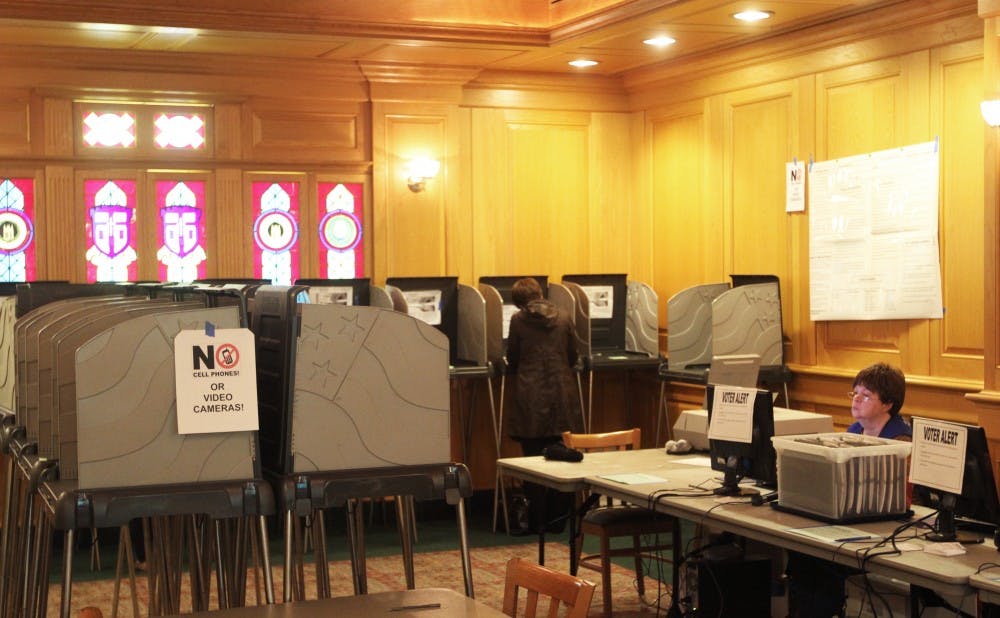Election Day brings a series of changes in voting for North Carolina's residents—but the early voting period showed that not all of the modifications have had the expected outcome.
Some experts initially said that a 2013 bill limiting early voting, eliminating same-day registration and requiring voters to present identification at polling places would drive down voter turnout. This was anticipated to affect Democrats in particular—whose most loyal constituents, minorities and youth, are already less likely to vote, especially in midterm elections. But early voter turnout has increased across the state, with Democrats accounting for much of the surge.
In the year since the bill was passed in the Republican-controlled legislature, it has been labeled by a number of state and national Democrats as a voter suppression campaign.
“These measures are not only unnecessary but have a racially discriminatory impact on voters,” said Chris Brook, legal director of the North Carolina American Civil Liberties Union.
But overall voter turnout has increased by nearly 20 percent from the 2010 midterm election, though population increase can account for some of the spike. A particularly large increase in turnout has come from African-American voters, said Josh Lawson, public information officer for the North Carolina State Board of Elections.
When compared to early voting in the 2010 election, African-American turnout has increased 44 percent.
David Rohde, the Ernestine Friedl professor of political science, attributed the overall increase in early voting at least in part to activism from the left.
“It’s clear that the Democrats have tried to use the change in the law as a motivator for people to go out and vote, implying that the Republicans are trying to restrict their voting,” he said.
But early voting rates have not been on the rise across all demographics when compared to four years ago. Lawson said the percentage of college-aged people who voted early this election dropped by 22 percent from 2010. He noted that factors beyond the new law may be at play.
The number of voter precincts at universities has fallen since 2010, Lawson said. Under Democrat governor Beverly Perdue in 2010, the state officials in charge of setting up elections were more likely to set up voter precincts at universities—typically hubs for younger, more liberal voters. When Republican Pat McCrory took the governor’s office, a number of those precincts changed location.
Although Duke has had a campus polling place in recent presidential elections, the University typically does not have on-campus voting for midterm elections.
In addition, recent legal battles over the voter fraud bill have left some voters— particularly younger, out-of-state college voters—wondering what it will take to cast their ballot this midterm season.
Early in October, the Fourth U.S. Circuit Court of Appeals restricted North Carolina from enacting portions of the law, including the same-day registration ban, until the legal battle over the constitutionality of the law is settled in the summer of 2015. The Supreme Court reversed that decision two weeks later—causing some confusion among the electorate, Brook said.
In particular, Brook said many constituents have called the ACLU office to ask about same-day registration and whether or not voter ID would be required this election cycle.
Same-day registration has been outlawed, but voters will not be required to present ID at polling stations until 2016.
“Everybody is very concerned about the way this [bill] passed through the legislature with a very minimal amount of public participation and oversight,” Brook said.
Lawson noted that the bill also allocates some funds to the Board of Elections that allow it to hire a team of voter outreach specialists, who will educate the public about the requirement changes.
Rohde said he is skeptical about the idea that the anti-voter fraud bill was passed only to limit voter fraud.
“Is there some voter fraud? I’m virtually certain," Rhode said. "There’s fraud in almost everything that goes on. Is there enough to indicate this is a big thing? No.”
Todd Poole, the executive director of the North Carolina Republican party, said he does not view voter fraud or the bill that was passed as political issues.
Despite the confusion, Brook said it is important that everyone remain a participant in the political system.
“We are encouraging everybody to get out there and vote and be knowledgeable about what the new rules are,” he said.
Get The Chronicle straight to your inbox
Signup for our weekly newsletter. Cancel at any time.

